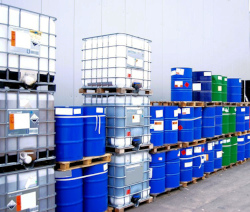Exceptions to the Standard
The Hazard Communications Standard does not apply to:
- regulated hazardous waste when the hazardous substance is the focus of remedial or removal action;

This hazardous waste is the focus of remedial action at this site, therefore HCS does not apply.
- tobacco or tobacco products;
- wood or wood products, including lumber which will not be processed. Wood or wood products which have been treated with a hazardous chemical. (Wood which may be subsequently sawed or cut, generating dust, are not exempted);
- manufactured items other than fluids or particles:
- which are formed to a specific shape or design during manufacture;
- which have end use function(s) dependent in whole or in part upon its shape or design during end use; and
- which under normal conditions of use do not release more than minute or trace amounts of a hazardous chemical and do not pose a physical hazard or health risk to employees;
- food or alcoholic beverages which are sold, used, or prepared in a retail establishment, and foods intended for personal consumption by employees while in the workplace;
- cosmetics which are packaged for sale to consumers in a retail establishment, and cosmetics intended for personal use by employees while in the workplace;
- consumer products or hazardous substances where the employer can show that:
- they are used in the workplace for the purpose intended by the chemical manufacturer or importer of the product, and
- the use results in a duration and frequency of exposure which is not greater than the range of exposures that could reasonably be experienced by consumers when used for the purpose intended;
- nuisance particulates where the chemical manufacturer or importer can establish that they do not pose any physical or health hazard;
- ionizing and non-ionizing radiation; and
- biological hazards.
Knowledge Check Choose the best answer for the question.
1-5. What is an exception to the HCS?
You forgot to answer the question!
